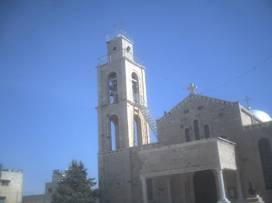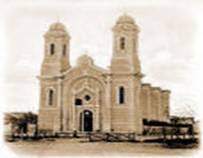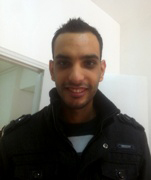The Greek Catholic Patriarchate
Greek Catholic Patriarchate
In 1724, the Antioch Patriarchate split into two parts: Melkite Greek Catholic and Greek Orthodox. The Orthodox part renounced the title “Melkite”, while the catholic part kept it. A movement of unity with the Holy See spread in all the Arab countries, especially in Lebanon and Syria. This movement extended to the north of Palestine, especially in the Galilee.
The Catholic part had to live underground, and to suffer from oppression due to its communion of faith with Rome. In the Turkish era, the Greek Catholic followed the Greek Patriarch of Constantinople. However, the Ottoman Sublime Porte did not recognize them as an independent legitimate body (the right of jurisdiction).
 |
 |
With the increasing number of the Greek Catholic, they became in 1772 under the authority of the Patriarch of Antioch, who also carried the title “Patriarch of Alexandria". Therefore, the Greek Catholic Patriarch became the Patriarch of Antioch, Jerusalem, Alexandria and the entire east.
When talking about the Greek Catholic Church in the Holy Land, we should never forget to mention the Basilian Salvatorian order and the monks and priests of the Savior’s Abbey, who have been working for 300 years. The number of faithful fathers who served the Holy Land in Jerusalem has reached 141 priests including patriarchs and bishops. Palestine has granted “the Salvatorian Congregation” 96 priests.
 |
 |
 |
More...

Come and celebrate Palestine! The Palestinian Summer Celebration is a unique annual program that gives people from all over the world the chance to encounter the life, culture, and politics of Palestine.
From 02 July – 31 August 2024
July 2024: from 02nd to 27th of July 2024 (1st month)
August 2024: 06th to 31st of August 2024 (2nd month)
December 28th 2024- January 10th 2025
 The Christmas Pilgrimage for Peace is an annual program that gives people from all over the world the opportunity to experience oriental Christmas in Bethlehem, and to celebrate it with the most hospitable families in the Holy Land. In addition to visiting all key religious sites—including the Church of the Nativity, Shepherd’s Field, Jerusalem, and the Sea of Galilee—program participants will also learn about the current movement for peace and justice in Palestine, by meeting with human rights activists and political officials. The Christmas Pilgrimage for Peace will provide all comers a rich encounter with the culture of our land, in a place unlike any other: the place where Christ was born.
The Christmas Pilgrimage for Peace is an annual program that gives people from all over the world the opportunity to experience oriental Christmas in Bethlehem, and to celebrate it with the most hospitable families in the Holy Land. In addition to visiting all key religious sites—including the Church of the Nativity, Shepherd’s Field, Jerusalem, and the Sea of Galilee—program participants will also learn about the current movement for peace and justice in Palestine, by meeting with human rights activists and political officials. The Christmas Pilgrimage for Peace will provide all comers a rich encounter with the culture of our land, in a place unlike any other: the place where Christ was born.
Ahlan wa sahlan!
Since 2005, Siraj has managed to achieve its vision of becoming one of the most prominent and innovative organizations which has driven the development of responsible tourism, re-branding Palestine as a destination for experiential travel and human connection.
As part of the Palestinian Center for Rapprochement between People (www.pcr.ps), and the sole non-profit organization, licensed by the Ministry of Tourism, our vision continues to be to welcome international visitors to immerse themselves into Palestinian hospitality, our cultural heritage and unspoiled nature, bringing about a life-enriching exchange and understanding between Palestinians and visitors from other cultural, religious and social backgrounds. Through Siraj’s vision, we were instrumental in leading the initiative to create the Network of Experiential Palestinian Tourism (www.nepto.ps), as well as the Palestinian Responsible Tourism initiative (www.pirt.ps).
We are pioneers in Palestine, developing diverse responsible tourism programs, such as local community tourism, home stays, interfaith, pilgrimages, cultural and fact-finding, as well as other special interest programs, such as environmentally friendly tourism packages, including, the Nativity Trail, Sufi Trail, Jerusalem Wilderness and Abraham Path - the first long distance walking route through the West Bank (www.masaribrahim.ps), walking/hiking (www.walkpalestine.com) and cycling tours (www.bikepalestine.com).
We create unique tourism products, which maximize the contribution of the local community. We train locals within rural and Bedouin communities to be empowered, becoming the decision makers and owners of the packages which we offer to visitors, thus increasing local engagement, economic benefits through job creation, and chances for improved social development. We advocate best practices resulting in positive impacts, while minimizing negative effects on our cultural heritage and environment.
In our website, you will discover the unique programs that we offer or that we can happily tailor according to your interests and specific needs.
We look forward to welcoming you to Palestine!
The Siraj Team |
|
|
|
MICHEL AWAD, DIRECTOR OF SIRAJ CENTERMichel Awad, born in the town of Beit Sahour in Palestine, and lives there today. Michael is a tri lingual, where Arabic is his mother language, he has learned German and English at Talitha Kumi School in Beit Jalla. Michael has studied Travel Management in Bethlehem University. In Year 2004 he became an Instructor for Travel Management in Bethlehem University. Michael is a cofounder of Siraj Center for Holy Land Studies where he works as the executive director of the Siraj Center. Michael is a board member of the Palestinian Society for Travel and Tourism Agents. Awad has gained various Experiences in organizing different kind of Programs for International visitors to Palestine, which enable them to encounter the Real Palestine Life and Culture. He represented Siraj Center as a member in the Steering Committee for the Palestinian Initiative for Responsible Tourism (PIRT). Through his participation in the (PIRT) he has helped writing and developing the Palestinian Code of Conduct. Michael also is an active member in a variety of Palestinian community organizations. |
|
|
GEORGE S. RISHMAWI, PROMOTION COORDINATOR, SIRAJ CENTERGeorge S. Rishmawi is a Palestinian activist from Beit Sahour, who believes in and works for peace using non-violent methods. He holds a Bachelors Degree in English language and a Diploma in Translation from Birzeit University. His wide network of relations of people and organizations made him the best promotion manager and coordinator for Siraj Center. he is also the Executive Director of the Palestinian Heritage Trail, a programm which bring people from all faiths and backgrounds to walk and hike in Palestine between Jenin and Hebron and learn about one going Conflict and Palestinian values and traditions. George has undertaken speaking tours throughout Europe and the USA giving talks on various subjects related to the on-going Palestine-Israel situation. He has given training in non-violence to groups all over Palestine. He has been involved in PCR since 1991 He served as member of the Executive Committee for PCR (2001 - 2003). George his the vice President of Board of the Arab Orthodox Cultural Club in Beit Sahour, the largest Palestinian Sports and Cultural club in Palestine. |
 |
MICHAEL ABU SA'ADA, DAILY OPERATION, FRONT DESKMichael manages the guest hosues that Siraj is running. He is responsible to make the needs of the hotels available, daily purchases and financial management of the incoming guests in the two guest-houses. Michael is a 2009 graduate of Bethlehem University with a Diploma in Travel Agency Management. He has been working with PCR since 2011. |
 |
RANIA SABABA-AWWAD, DAILY OPERATIONRania Sababa Awwad, Born in Beit Sahour and graduate of Bethlehem University in 1996 with a High diploma in Hotel Management & Tourism. Rania was involved in PCR since 1992 for some years. She rejoined PCR after assuming her work with Siraj Center in early 2013 as a daily operation co-ordinator. Rania has a very good background in Folklore Dancing and has been trainer and leader of one of the local folklore dancing groups in the area. |
 |
MAYADA SALSA', DAILY OPERATIONMayada works as the Tour Operator and Social Media Officer at Siraj. Her main job is to design, coordinate and follow up tour programs incorporated in trips, hiking, Biking. She is also involved in preparing the monthly newsletter and updating Siraj's website. Mayada has a B.A. degree in Geography / Political Science, from Birzeit University which gave her a rich background and experience in organizing and leading the various programs and activities with the different groups and pilgrimages. In previous years, she worked as Research Assistant in Geographic Information Systems (GIS) and Remote Sensing Unit at The Applied Research Institute – Jerusalem “ARIJ” in Bethlehem. She also worked as a teacher at the Latin Secondary School and the Greek Orthodox School in Al-Taybeh near Ramallah, where she originally comes from. |
 |
NISREEN BARDAWEEL, BOOK-KEEPERNisreen is a graduate of Bethlehem University of English Literature with a minor in Business Administration. She has been a PCR staff member since 2008. Currently Nisreen serves as Administrative Assistant to the Exc. Director and a General Book Keeper for PCR. She works closely with the four PCR department staff members. |
 |
NERMINE ABU SAADA, SECRETARYGraduate of Bethlehem University in Travel and Tourism Management of 2012. Nermeen was born in Beit Sahour and has joined PCR in 2012. Nermeen's basic taks is to organize the office appointments and keeps order in all PCR departments. She is instrumental in the Tunes for Peace Project, and keeps contact with the families of the students. |
 |
LOURD HAZBOUN, OPERATIONLourd Hazboun, born in Bethlehem, graduated from Bethlehem University in 2018 with a diploma in travel and tourism management. After graduation Lourd started working at travel and tourism office in Beit Sahour. Also she has been working with PCR since 2019 as a daily operation at Siraj center. |


